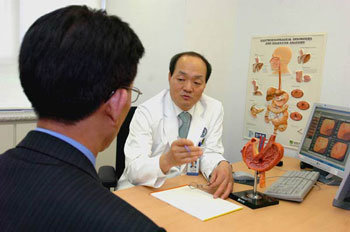Death Risk Lower at Hospitals That Perform Many Surgeries
Death Risk Lower at Hospitals That Perform Many Surgeries
Posted February. 12, 2007 07:41,

Is it fair to say that hospitals that perform a large number of operations provide higher-quality medical services?
When the need arises, many people go to hospitals that have performed many surgeries, thinking that the more operations performed, the better the outcome will be.
On the basis of the reviews made by the Health Insurance Review Agency from January 2001 through December 2005, a research team led by Professor Lee Sang-il (Department of Preventive Medicine, College of Medicine, Ulsan University) and Yang Seung-wook (Clinic of Medical Management, College of Medicine, Seoul National University) analyzed the number of surgeries for esophageal cancer, pancreas cancer, stomach cancer, colorectal cancer, lung cancer, bladder cancer and breast cancer to compare the death rates 30 days after the surgeries and the survival rates after five years. The results showed that hospitals that performed fewer surgeries (bottom 25 percent) had significantly higher risks of dying 30 days after the surgeries than those with extensive surgery experience (top 25 percent).
Hospitals performing lots of cancer operations may not be the best option for patients that need to get surgeries as early as possible, as they will have to wait longer to be operated on, stated Lee. You need to take everything into account, because it will be just fine to choose a nearby general hospital if you undergo a simple procedure.
As Lee said, the number of surgeries does not necessarily translate into quality of medical service. Hospitals performing large numbers of operations tend to have more operation rooms or beds than other hospitals. Therefore, the number of surgeries performed per bed or the number of professors in each specialty per bed should be considered.
When it came to the number of surgeries per bed, the National Cancer Center (NCC) and Korea Cancer Center Hospital (KCCH) took the first and second place, respectively. Their large numbers of cancer patients per bed means that in those hospitals, the ratio of cancer patients to ordinary ones is high. The two hospitals are cancer center-specialized hospitals that are oriented toward cancer patients.
Cheil General Hospitalthe favorite among obstetrics and gynecology patientshad the largest number of ovarian cancer and cervical cancer surgeries per bed. Establishing Koreas first uterus cancer ward in 1963, the hospital has taken the lead in diagnosing gynecologic cancer. It recently adopted intelligent computers in cervical cancer diagnoses to significantly reduce misdiagnosis.
For the Asan Medical Center of Seoul, which performs the largest number of cancer surgeries in Korea, where does its competitive edge lie? The hospital has the largest number of beds (2,200) and intensive care unit (ICU) beds (170) in Korea. It is analyzed that its specialty-oriented system, which has begun from its very foundation in 1990, has helped its doctors surgery skills. Here, doctors who conduct breast cancer surgeries and those doing thyroid surgeries take care of their specialties alone. On the other hand, in most hospitals, doctors performing breast cancer surgeries often perform operations for thyroid cancer or colorectal cancer, too.
Samsung Medical Center of Seoul, which ranked first in lung cancer, has established an excellent collaborative diagnosis system. It treats patients on the basis of collaborative diagnoses among pulmonology, imaging, thoracic and cardiovascular surgery, hematology-oncology, therapeutic radiology and others.
The number of professors in each specialty per surgery is also significant, as large numbers of surgeries per capita indicates more patients are attracted to the hospital.
When the number of cancer surgeries was divided by the number of professors in each hospital, Seoul National University Hospital ranked first by recording around 700 in the number of surgeries for thyroid cancer per professor. In the hospital, Prof. Yoon Yeo-gyu of the Department of Surgery has performed 700 to 800 thyroid cancer surgeries per year. He operates on a minimum seven to a maximum 10 thyroid cancer patients a day. In liver cancer, the hospital also showed the largest number of surgeries per professor.
Severance Hospital has the largest number of stomach cancer surgeries per professor. Professors Roh Seong-hoon and Hyung Woo-jin (of the Department of Surgery) alone performed around 1,100 operations in 2006. Roh was selected as the best doctor of the year 2003 by the Dong-A Ilbo.
likeday@donga.com




![[단독]다주택자 대출연장 규제, 서울 아파트로 제한 검토](https://dimg.donga.com/c/138/175/90/1/wps/NEWS/IMAGE/2026/02/20/133392750.1.jpg)


